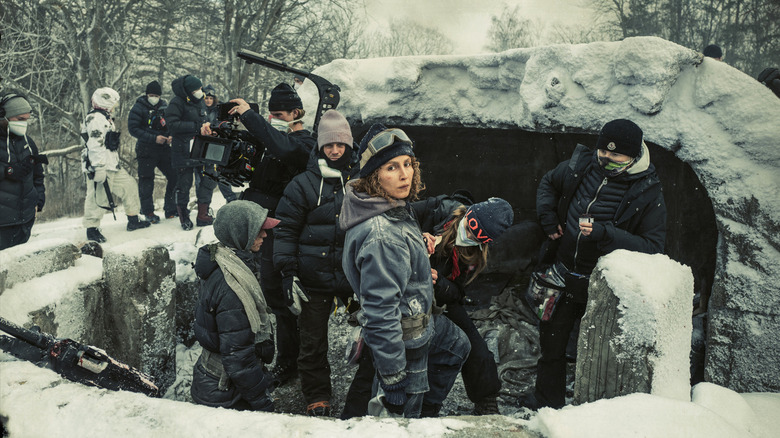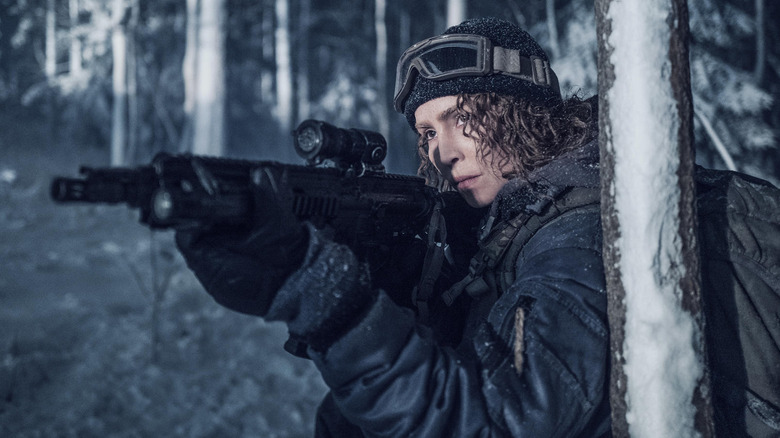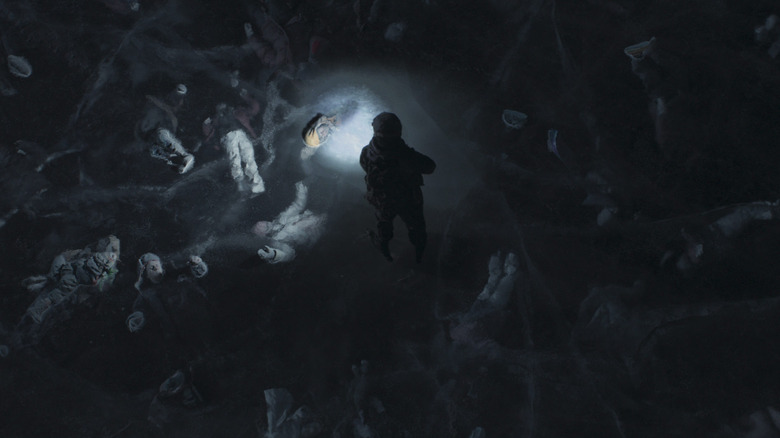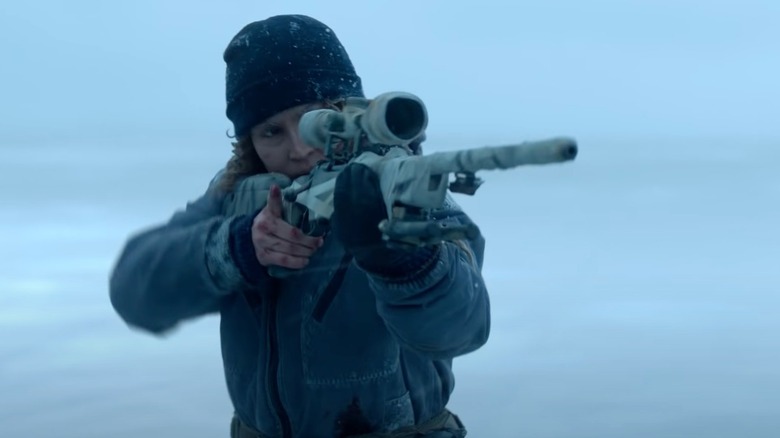Black Crab Director Adam Berg On The State Of The Action-Thriller In Sweden [Interview]
Director Adam Berg creates a surprising sense of scale with his directorial debut, "Black Crab." The war film, which involves a team on a suicide mission and a whole lot of ice skating, is by no means a big-budget film, but the adaptation of Jerker Virdborg's thriller novel would've popped on a big screen. As Berg and many other directors say, nature paints a bigger, lusher, and more vibrant picture than what's generally accomplished on green screen.
"Black Crab," which stars Noomi Rapace as one of six underdogs attempting to deliver a mysterious package to finish a war, is the kind of action-thriller Berg wishes the Swedish film industry produced more often. Recently, Berg told us about why his feature debut is a bit of an anomaly, his days directing music videos for the likes of Junkie XL, and why he'd prefer audiences didn't watch the dubbed version of "Black Crab" on Netflix.
'There are big scenes, but a lot of them are big because nature is big'
How did you land on how much to reveal and not to reveal about the war?
I think there's always a delicate balance between giving too much and giving too little, and we tried very hard throughout the film to not explain what has happened, not explain who's fighting, who's the enemy, all these kind of things that tend to be a bit boring, I think, when you explain too much. It was a dangerous choice in some ways, but not to give the characters too much backstory because they're just people who've been thrown into this conflict and had to fight for their lives and that kind of evolves. I really like that character, Malik, he has some dreams when he talks about furniture. I think everyone has these little hopes for the future. I think hope is the last thing that we abandon in a way.
Was the novel like that, just giving the barest of essentials?
Yes and no. You know more about the characters in the novel because it's a novel, so you have so much more time. There's quite a lot of little backstories, and that's really nice. I love the novel, but a lot of that stuff couldn't really work in our film. It's quite sparse as well. I would say in some instances you learn even less in the novel than you do in the film. It's maybe because it's also quite internalized, which we couldn't really use for the film. The inner dialogue gets you more of the paranoia, maybe, and the fear in the book. But you know even less of the mission and why they're doing it. It's interesting in that aspect as well, but we couldn't really make that work for us in the film. You need a bit more to drive it forward, I think.
I have no clue what the budget of this movie is, but it often plays as a big movie.
It wasn't as big as any summer movie. It's a Swedish movie. I think, in comparison, it would be a very small film. In a way some of it is, obviously, my experience from my background. I've done a lot of stuff like this before. I know how to do it.
We don't have huge spaceships landing. There are big scenes, but a lot of them are big because nature is big. There's a lot of scope in it that is just nature. We don't have huge mass scenes with thousands of people on the battlefield because we just couldn't. There was no way we could do that. We had to go big, but in a small way. I think sometimes that serves you quite well.
We have to adapt, try to fit the script to what we could do, but we try to be really clever about it. How do we make it feel big, but spending our energy and time and money on the few choice bits that's like, "OK, this is going to make everything look big and feel big." For the rest, we can be quite small. It was a matter of choice in some ways.
Speaking of your background, I just watched your Junkie XL music video.
How did you find that?
It's on YouTube.
Holy crap. I haven't seen that easily in 10 years.
What were the music videos and commercials, though, that made you feel prepared for "Black Crab"?
I've done a few things throughout my career that have a little bit of action sequences, the way you learn a little bit how to do that. I think music videos, somehow, are almost better because they are a little bit longer. They have a little bit more storytelling involved in them. It's a little bit more flash. In some ways, there is always very little money in a music video. In a commercial, you normally have so much money or you have a lot of money for 60 seconds, whatever, so you can kind of solve every problem.
In a music video, you have to be clever. Doing films like this, even though we have this [substantial] budget for Sweden, for sure, we had to be almost thinking about it like it's a music video. [Be] clever with how we actually tell this story and be economical in what we're spending it on. I would say that my music video experience is almost what prepared me the most on how to attack it. Obviously, the big budget commercials also prepped me for the bigger scope of things, and knowing how to use all the tools that were at hand.
Any music videos of yours you'd recommend to our readers?
I think my favorite one is for a band called Happiness. It's just an old couple dancing, but I think it's really beautiful. It's my favorite music video, for sure, that I've done. I would say that's my best one.
'People talk way too much in films'
The song during the very end, "Stay Dead," is a nice tongue-in-cheek choice.
It's actually by the band who's made the music for the whole film.
It's a cool score.
Thank you. I'm really happy with it. For the film, I think it was so important that the whole scenery and the landscape and the cold and the ice was a character in its own right. The music, I think, is always such an important tool. It's the highway into emotion and people's hearts. I think you can go very classical on a score and make sweeping strings and Hans Zimmer everything, but we wanted it to be quite cold and technological, almost, and quite hard — not so friendly.
We wanted the music to have that sort of heart beating factor to it. When we started talking with the band, who are incidentally also called Dead People, they had this song, and it just felt like it would be the perfect end song for the film.
Circling back to your previous experience and how it influenced this film, how did you want to blend practical and digital effects here?
I think it's so important to not feel post-production with the visual effects. If you make a spaceship or something like that, you know what it is, but you still have to believe in it. I think for something like this, where you deal with nature, for our film, it needed to be fantastical, but not past belief in a way. We worked quite hard to really make it look as natural as possible.
There's always the danger when you do a lot of the effects because you can make it look too good — the skies are too beautiful and the mist is just right. It's very hard to make it a little ugly and a little chippy. That's what we really try to achieve in some ways, just make it not too perfect all the time.
How much time did you shoot on the ice?
We shot quite a bit on ice. We shot really wide shots of the skaters, they are done for real. We shot for 10 days up in Jukkasjärvi, where the Ice Hotel is in Sweden. We shot on a frozen lake up there where we did a lot of the practical — the bodies in the ice, for instance, is done there, and the helicopter chase and stuff like that.
Noomi Rapace is one of those actors who'll ask for fewer lines. Some actors want more out of ego, but she'll ask for less if they're not necessary to the story. Did you two have those discussions about cutting her lines?
Oh, yeah. I would say it was a constant discussion on what was too expositional and too much. "Why would you say this here?" We changed a lot throughout that. I'm all for not having people speak because I think quite a lot of the time, people talk way too much in films. There's a lot of lines that were cut out from the film.
During those silent moments, what do you think Noomi gives you and the camera?
Obviously, a very good actress, but there's a lot of intensity in her. I think that she doesn't necessarily need lines, or it feels to me like there's almost a fire burning inside of her. When she's quiet and she's doing nothing, you can almost feel that energy and that inner fight constantly. I think sometimes the words get in the way of that intensity. Funny enough, it's like one of the best ways to let it out is to let her do nothing.
'In Sweden, the only thing that's dubbed are children's programs'
Noomi dubbed herself for the movie, but how would you feel if people watched the dubbed version?
In Sweden, the only thing that's dubbed are children's programs. We don't dub anything. For me, it's a very strange notion to dub stuff because it takes so much out of it. Even if you don't understand, you can hear the tone of voices and the different voices. It's stripping a character of a lot of their character.
For me, it's strange, but I'm also not used to it. In some countries, they are totally unused to things not being dubbed, but I'm happy if people watch it in its original language because, for me, it also adds flavor. I think when we did this film, I really wanted to make it in Sweden in Swedish just because it's such a Swedish story, and it wouldn't really work in the same way anywhere else. Could you see this being in America?
No. Not at all.
It just felt like such a Swedish or Nordic, Scandinavian story. I think language is a part of that. I think a dub is another filter to put between the viewer and the character somehow. It's a bit of a shame to do that, but whatever works. I can't really control it. I'd rather that someone sees it dubbed than not see it at all.
Correct me if this is a misconception, but I have heard that not a lot of action-thrillers like "Black Crab" get made in Sweden. Why is that?
Yeah, I would say I can't really remember any Swedish proper action-thriller that's ever been made here. Very few genre movies overall, I think. I mean, I'm sure you've seen Nordic crime noir kind of stuff coming out. All fine, but I'm a lover of genre movies. I think it's a shame that people are so scared of it, but I think there is an audience that wants it. The classic Swedish storytelling is relationship dramas or rom-coms and that kind of stuff. Action movies do get the most views in cinemas, though. I think, hopefully, this will help change it a little bit, so that more people there do it.
I think one of my favorite Swedish films of the last 15 years or so is "Let the Right One In." Very genre. Very beautiful. I would say they stretched their budget to breaking point, I'm sure. It looks fantastic. It didn't look small at all, and they were very clever with it. I think it begs for more stories like that to come out because it just adds something. I just think whatever origin they come from, it just gives a different spice to what you've seen so many times before. It's a shame that not more people are there to do it.
"Black Crab" is now streaming on Netflix.



